The 2018 summer interns share their experiences working at the JGI.
The JGI hosted a record number of summer interns in 2018, with 10 high school students, 8 undergrad students, and 10 graduate students. The interns came to JGI through a variety of programs, including the JGI-UC Merced integrated Genomics Internship (click here for more information on their experience) which recently celebrated its fifth anniversary, and the Biotech Partners program (click here for more information on their experience). Read on and from the students themselves about their experiences.
High School Students
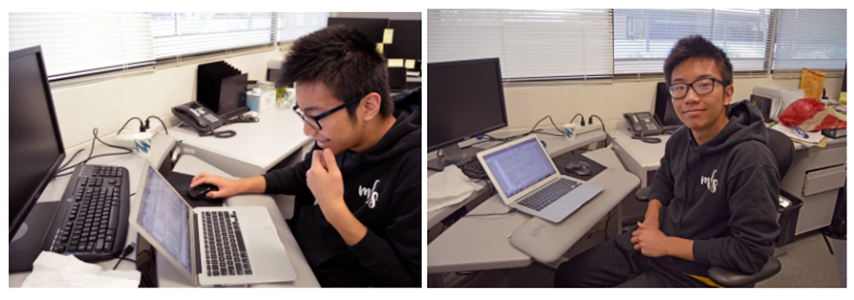
David Deng, Miramonte High School, class of 2019
JGI Mentor: Ben Bowen, Metabolomics Group
“The internship has affirmed my interest in pursuing a STEM career and helped me learn important skills that’ll be used in my near future. While I came to learn about computer science, my favorite thing is being able to learn more about biology and the sciences that computer science is used to analyze.”
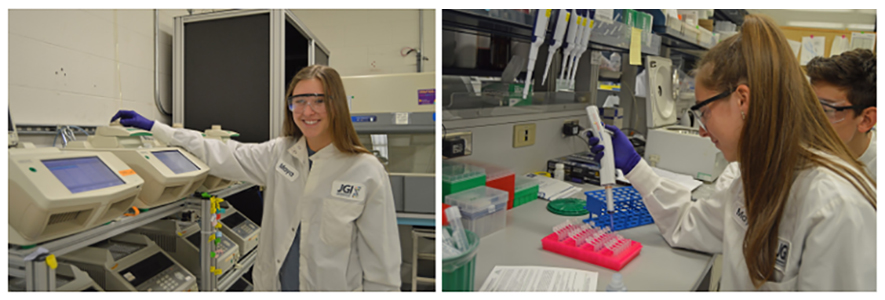
Maya Hanck, Carondelet High School, class of 2019
JGI Mentors: Robert Evans & Jan-Fang Cheng, DNA Synthesis Science Group
“My summer internship at JGI has really fostered my passion for science through all of the opportunities to learn that I have been given here. Now I definitely know that I want to pursue a STEM based career in my future, most likely in medicine. One of my favorite things about my JGI internship has been being able to learn new techniques by watching my mentor, Mr. Evans, and then being able to do them myself. The learning experience that I have gained here has been incredible and has been a highlight of my summer.”
Read more here about Maya’s internship.
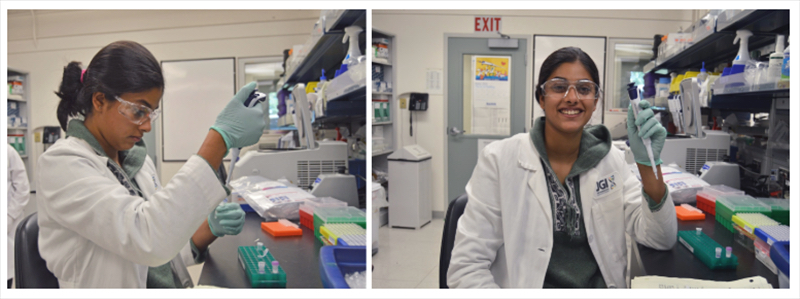
Shloka Janapaty, Presentation High School, class of 2019
JGI Mentor: John Vogel, Plant Functional Genomics
“I have been interested in pursuing a STEM career ever since middle school. Interning at JGI has not only solidified that interest, but has also taught me important skills in my research area that go beyond any textbook or high school class. I am inspired by experts at Berkeley Lab who are so passionate about their research, especially my mentor Dr. Vogel! One of my favorite parts has been the collaborative and dynamic environment at weekly team meetings.”
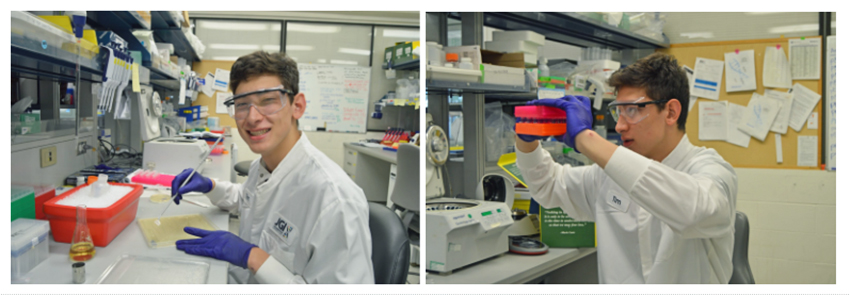
Timothy Haruta Kostolansky, De La Salle High School class of 2019
JGI Mentors: Robert Evans & Jan-Fang Cheng, DNA Synthesis Science Group
“This summer internship has further exposed me to the laboratory setting beyond my AP Biology class labs and my internship last summer with the JGI Vogel lab. This exposure has helped me gain an appreciation for the science that happens here and has inspired me to continue exploring synthetic biology and biotechnology. One of my favorite parts of the internship has been the application of textbook biology I learned at school to “real-life” biology used in a laboratory setting.”
Read more here about Tim’s internship.
Undergraduate Students
Shruthi Reddy, UC Berkeley, class of 2022
JGI Mentor: Esther Singer, Single Cells Group
“Interning at the JGI has confirmed my interest in pursuing a STEM career and conducting research alongside studying medicine in the future. Over the summer, I have been exposed to a vast variety of topics and applications of science not typically taught in a classroom setting, and have gained valuable knowledge, skills, and experience that will better prepare me for a career in STEM. Having the opportunity to talk to so many accomplished and passionate scientists about their research has been one of my favorite things about this internship. It was both inspiring and motivating to learn about all the different fields and specializations within biological research, and the multitude of projects being worked on at JGI!”
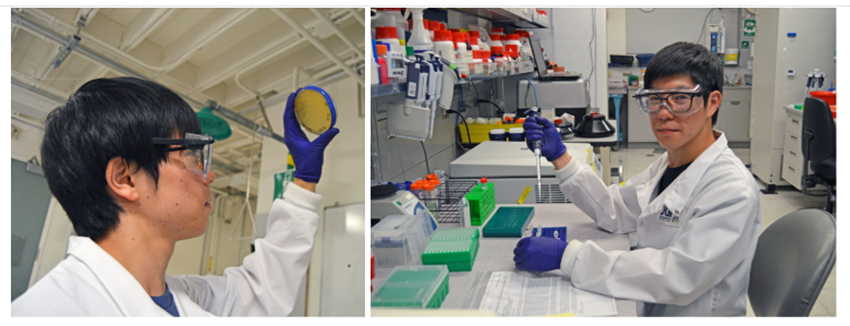
Yusuke Sasaki, Kyoto University, class of 2020
JGI Mentor: Yasuo Yoshikuni, DNA Synthesis Science Program
“Doing the internship at JGI has provided me different aspects of scientific field. Discussions with my mentor and other scientists at JGI have inspired my interests in science, given me guidance for required knowledge and skills in developing a STEM career. People at JGI kindly gave me their time and guidance.”
Elise Schiappacasse, Chapman University, class of 2020
JGI Mentors: David Gilbert & Massie Ballon
“My internship at the JGI has shown me that there is more to the overall functioning of a laboratory than just the science that takes place. Working with Communications in the Operations department has shown me the management functions that are vital for the lab to continue existing, and without ops the scientists wouldn’t be able to focus on what they do best. My mentors taught me the importance of networking and how it benefits the lab because it spreads the word of JGI’s accomplishments and opens the door for many other opportunities for the JGI. Part of my job was interacting with all of the interns and the scientists that work here and I can say that it was a great experience to be able to meet people from every corner of the workplace. I got to hear about all the different experiments going on as well as learn about who each person is on a more personal level.”
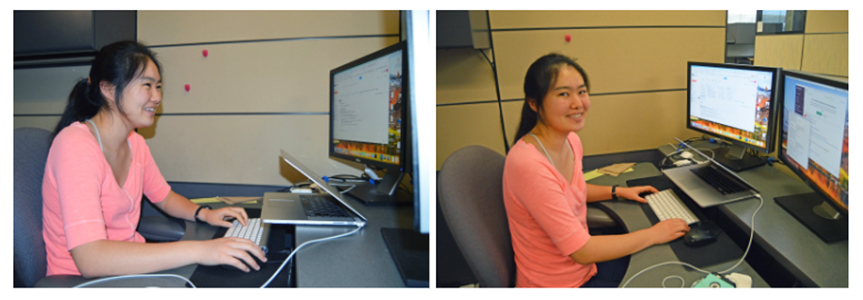
Arielle Soomi Yoo, UC San Diego, class of 2020
JGI Mentors: Julie Kang & Chris Beecroft, Data Management
“I have gained valuable knowledge about data management that I wouldn’t have had access to without JGI. JGI helped me see the amazing things people in my field of interest accomplish and how important proper data organization is for published papers. In the future I hope to learn more about bioinformatics and continue to solidify my interest in STEM. My favorite thing about my JGI internship is the people. My mentors have been super encouraging while guiding me through tasks, and I also appreciate all the speakers that explain what fascinating research they have been working on. Everyone helps support the friendly work environment and makes it such a pleasure to be here!”
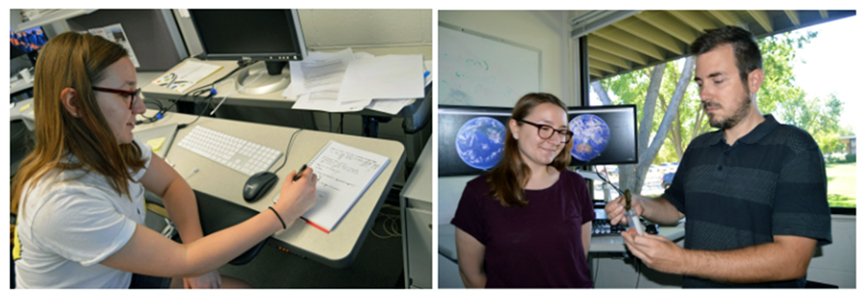
Anna Tancredi, Kenyon College, class of 2019
JGI Mentors: Frederik Schulz & Tanja Woyke, Single Cells Group
“Meeting people at JGI and Berkeley Lab who work at the intersection of science and management has broadened my perspective of the diverse STEM careers there are beyond academic research. The energetic atmosphere. You can feel the excitement and care everyone has for their work.”
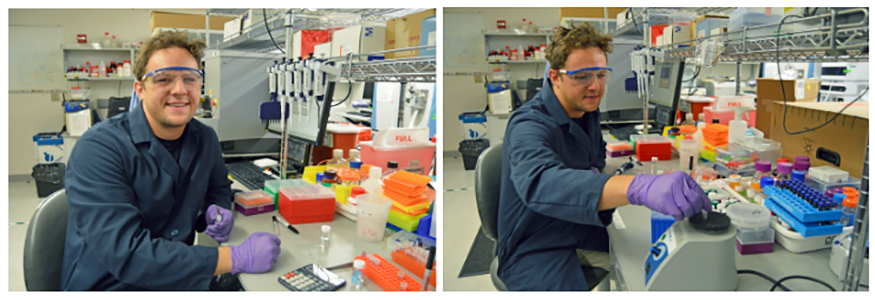
Hayden Veytia, Reed College, class of 2019
JGI Mentors: Ben Bowen & Trent Northen, Metabolomics Group
“This internship allowed me to see how a research lab operates. More than this, it has reconfirmed my desire to pursue a career in science and more specifically to do research. I believe that this internship will also help me get in to a grad school where I study more science. I didn’t really know what to expect coming to JGI, but I found that I got to work with really kind and intelligent people.”
Katie Whiting, Saint Mary’s College, class of 2019
JGI Mentors: Joelle Schlapfer & Trent Northen, Metabolomics Group
“I’ve known for a while that I want to pursue a career in STEM, but my internship at JGI has given me the chance to see what a career in STEM can look like outside of a college/university setting, has given me experience with methodologies for research not available at my university, and has given me the chance to discuss how to navigate graduate school with scientists who have already gone through PhD programs.My favorite thing about JGI is the collaborative process of research that is done by the scientists, and getting to be a part of that collaborative network when it comes to the work I have been doing.”
Graduate Students
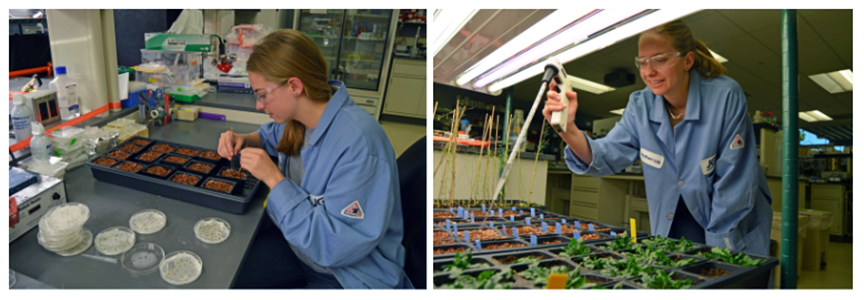
Sarah Brecht, North Carolina State University Masters, class of 2020
JGI Mentor: Joelle Schlapfer, Metabolomics Group
“JGI has opened the doors to many new processes and ideas that I was not exposed to during my Undergraduate career. I will be starting Graduate school in the Fall and I feel that JGI has not only helped me master lab based skills but also supported my curiosity in STEM. My favorite thing about my JGI internship is the exposure to new technologies and collaborations between the labs.”
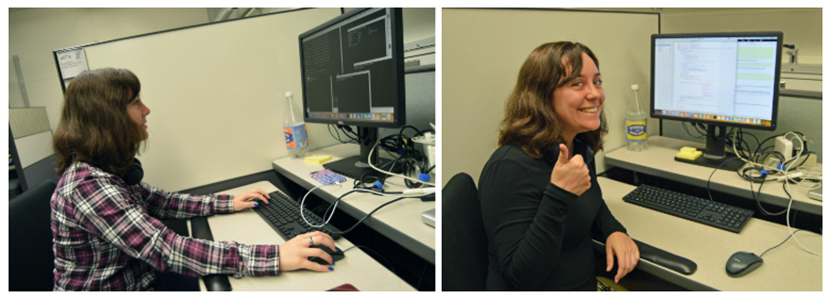
Kayla McCue, Massachusetts Institute of Technology, 2nd year grad student
JGI Mentor: Zhong Wang, Genome Analysis Group
A summer intern through the DOE Computational Graduate Science Fellowship (CSGF) Program
“I had already planned to pursue a STEM career, but it has allowed me to explore an aspect of computational biology that I would likely not have been exposed to otherwise. I’ve really enjoyed interacting with the JGI team.”
Rachel Orsini, Stanford University, First year Masters
JGI Mentor: Zhong Wang Genome Analysis Group
A summer intern through the DOE Mickey Leland Energy Fellowship.
“I plan on pursuing a STEM career and this internship has confirmed my interest in the biological sciences as an application of computer science. The team at JGI is so generous with their time and willing to help, designing my projects here so that I could learn new and useful skills.”
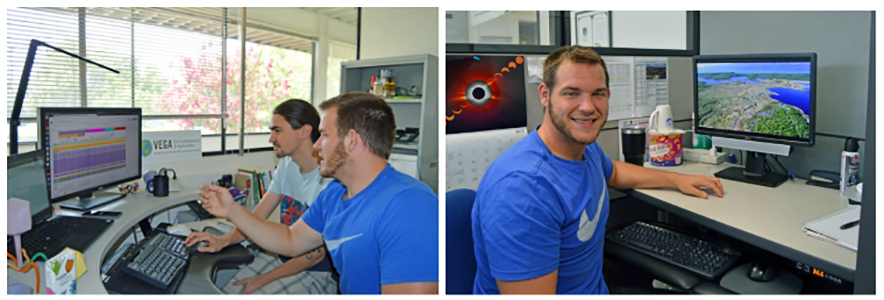
Gary Trubl, Ohio State University PhD program
JGI Mentor: Dr. Simon Roux
Part of the DOE Office of Science Graduate Student Research (SCGSR) fellowship
“Over the past two decades we have learned viruses are major players in ocean biogeochemical cycling and we know virtually nothing about them in soil ecosystems. It has been my job to develop methods to access and characterize soil viruses and make them available and easy to do for other scientists researching soil systems.”
Read more here about Gary’s time here at the JGI.